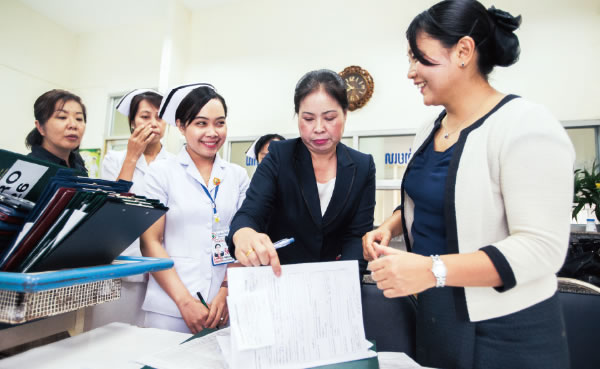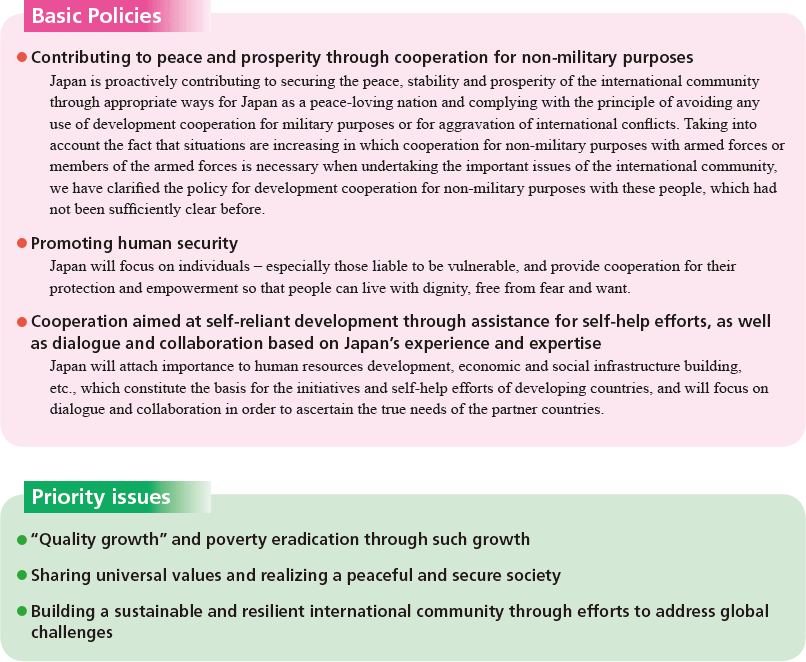Chapter 2 Looking Back on the Year 2016 under the Development Cooperation Charter

Ms. Miwa Sonoda (right), an expert and a leader of the JICA maternal and child health project, visits the hospital with the head of the hospital in Vientiane, Laos, and consults with local nurses. (Photo: Shinichi Kuno / JICA)
Section 1 What is the Development Cooperation Charter?
The Development Cooperation Charter is the most fundamental policy document for the development cooperation policies of Japan. It was established and approved by the Cabinet in February 2015 as the first revision of the Official Development Assistance (ODA) Charter in 12 years. We have implemented development cooperation policies under the new Charter in 2016, the second year after the revision.
Since 1964, over more than 60 years, Japan has promoted development cooperation, primarily in the form of ODA, contributing to the peace, stability and prosperity of the international community. In recent years, development issues arising from globalization, etc. have become more diverse, complex, and wide-ranging. The international community has to undertake a plethora of issues, including regional conflicts, large numbers of refugees, frequent terrorism, global warming, etc. Furthermore, the roles of public and private funds other than ODA and a variety of actors other than government are growing; therefore the importance of collaboration amongst these actors is increasing. Moreover, in order to make development sustainable and effective, not only the initiatives of developed countries but also the collaboration between developed countries and developing countries are essential.
In this new era, Japan is resolutely continuing its course as a peace-loving nation while positioning development cooperation as a part of its proactive contribution to peace based on the principle of international cooperation, and specifically undertaking development cooperation in order to utilize ODA strategically as an important diplomatic policy tool. Based on such a recognition, the Development Cooperation Charter is also consistent with the basic policies of Japan, in particular the National Security Strategy and the Japan Revitalization Strategy.
The objective of development cooperation is to contribute more proactively to securing the peace, stability and prosperity of the international community. Furthermore, such cooperation will also lead to ensuring the medium- to long-term national interests of Japan, such as maintaining the peace and security of Japan, achieving further prosperity, realizing an international environment that provides stability, transparency and predictability, and maintaining and protecting an international order based on universal values. In this way, the international community and Japan can build a Win-Win relationship. The Development Cooperation Charter makes this point clear, positioning ODA as the driving force for promoting a variety of activities that help development and stating that the priority issues shall be proactively undertaken in accordance with the following basic policies.

In 2016, Japan, as the G7 chair country, presented specific initiatives and led discussions for responding to the issues faced by the international community, in fora such as the G7 Ise-Shima Summit, TICAD VI, the ASEAN Summit, the United Nations Summit for Refugees and Migrants, etc. It is important to take the lead in efforts to achieve the SDGs based on the SDGs Implementation Guiding Principles established in December 2016. Japan intends to continue steadily implementing these initiatives, under the auspices of the Development Cooperation Charter, while also proactively and strategically utilizing ODA.
